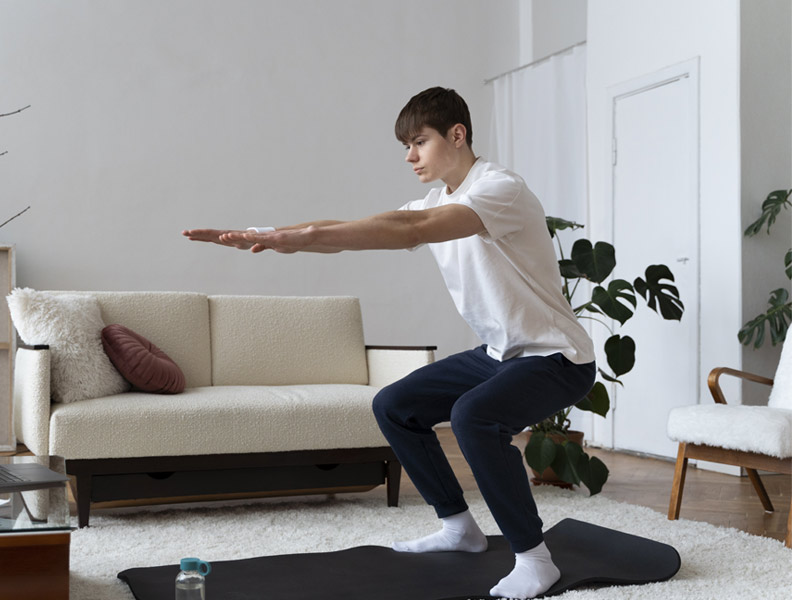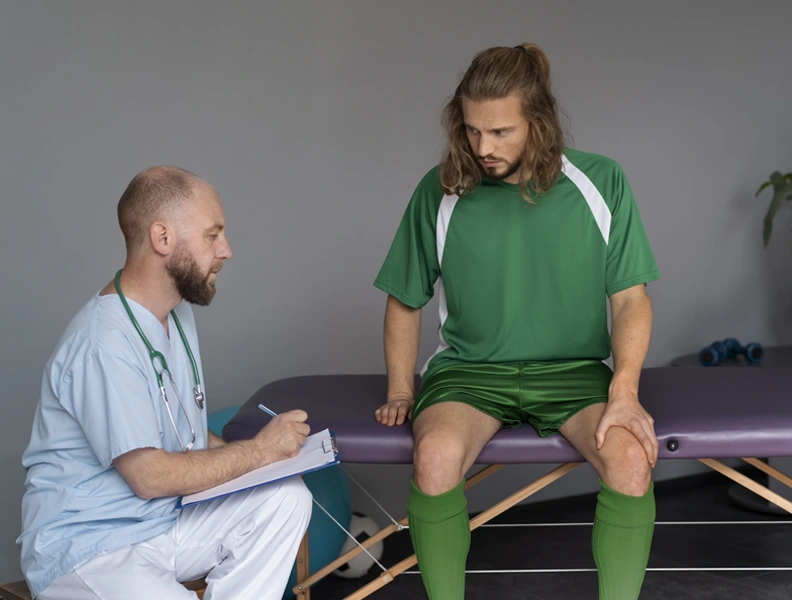A concussion is more than just a bump on the head—it’s a mild traumatic brain injury (mTBI) that can disrupt normal brain function. While symptoms like headaches, dizziness, and confusion might seem temporary, an undiagnosed or untreated concussion can lead to long-term complications, including chronic headaches, cognitive issues, and even post-concussion syndrome. That’s why knowing how to test for a concussion is essential for early intervention and proper recovery.
Testing for a concussion isn’t as simple as taking a quick scan. No single test can definitively diagnose a concussion, which is why medical professionals rely on a combination of assessment methods. These include neurological exams, cognitive tests, balance assessments, and symptom checklists. In some cases, advanced imaging techniques like MRI or CT scans are used to rule out more severe brain injuries, but they don’t always detect concussions themselves.
Traditional concussion testing often overlooks one critical factor—the role of the nervous system and muscle function in recovery. At Moore MyoWorx, we take a more comprehensive approach, evaluating not only brain function but also the impact of the injury on the body’s overall stability and nervous system regulation. By understanding the full picture, we can help patients recover faster and more effectively.
In this post, we’ll break down the key methods for how to test for a concussion, explain the signs to watch for, and introduce a smarter way to assess and treat concussions. If you or someone you know has experienced a head injury, knowing the right steps to take can make all the difference in long-term health. Let’s dive in!
What is a Concussion Test?
A concussion test is a structured assessment used to evaluate brain function after a head injury. Its primary purpose is to determine whether a concussion has occurred and to gauge the severity of symptoms. Since concussions don’t appear on standard imaging tests like X-rays or MRIs, these assessments rely on neurological, cognitive, and physical evaluations to detect dysfunction in the brain.
There are several types of concussion tests, each designed to assess different aspects of brain health:
- Symptom-Based Assessments – Patients report common concussion symptoms such as headaches, dizziness, nausea, or brain fog. These self-reported evaluations help track symptom progression. The Post-Concussion Symptom Scale (PCSS) is an example of a test we use at Moore MyoWorx.
- Cognitive Tests – These measure memory, attention, reaction time, and problem-solving skills. The Cognitive Assessment (by Creyos), the Immediate Post-Concussion Assessment and Cognitive Testing (ImPACT) and Standardized Assessment of Concussion (SAC) are commonly used tools.
- Balance and Coordination Tests – Concussions can disrupt the brain’s control over movement. The Balance Error Scoring System (BESS) and tandem gait tests evaluate postural stability and coordination.
- Neurological Exams – A healthcare provider checks pupil reactions, reflexes, motor function, and sensation to identify abnormalities in brain function.
- Vestibular and Oculomotor Tests – Since concussions often affect eye movement and balance, tests like the Vestibular/Ocular Motor Screening (VOMS) help identify issues with vision and dizziness.
Each of these assessments can be a useful tool in diagnosing a concussion and guiding treatment. A thorough concussion test ensures early detection, which is crucial for preventing long-term complications and promoting proper recovery.
Symptoms to Check Before Testing

Before testing for a concussion, it’s crucial to recognize the warning signs. A concussion isn’t always as obvious as getting knocked out or feeling immediate pain. Sometimes, symptoms can be subtle and develop over hours or even days. Ignoring these signs can delay recovery and lead to more serious complications. This article outlines the top 10 concussion symptoms to watch out for.
Common Concussion Symptoms
One of the most telling signs of a concussion is dizziness or balance issues. If you feel unsteady on your feet or like the room is spinning, your brain may be struggling to process movement properly. Confusion or brain fog is another red flag—if you’re struggling to concentrate, remember recent events, or feel mentally sluggish, your brain function may be impaired. Headaches, nausea, and sensitivity to light or noise are also common indicators. Some people experience blurred vision, ringing in the ears, or difficulty finding the right words when speaking.
When to Seek Medical Attention
While mild symptoms may improve with rest, certain warning signs require immediate medical attention. If you or someone you know experiences repeated vomiting, worsening headaches, seizures, or loss of consciousness, get medical help right away. Other red flags include slurred speech, weakness in the arms or legs, or sudden personality changes like excessive irritability or agitation.
Why Recognizing Symptoms Matters
Even mild concussions can have lasting effects if left untreated. Recognizing the early signs allows for timely intervention, which can prevent prolonged symptoms and complications like post-concussion syndrome. If you suspect a concussion, rest and monitoring are essential before undergoing any formal testing. Your brain’s health is too important to ignore—early awareness leads to better recovery.
Quick Concussion Test at Home

If you or someone you know has suffered a blow to the head, a quick at-home concussion test can help identify potential signs of a concussion. While these tests are not a substitute for professional medical evaluation, they can provide insight into whether further medical attention is necessary. A concussion affects brain function, leading to symptoms like dizziness, confusion, headaches, and balance issues. Simple cognitive and physical assessments can help determine if these symptoms are present.
Below, we outline several at-home tests to check for concussion symptoms. If any test raises concerns, seek medical attention immediately.
Memory and Orientation Test
Memory and orientation are critical cognitive functions that can be affected by a concussion. A simple test involves asking the individual basic questions:
- What is your name?
- Where are you right now?
- What day is it today?
- Can you remember three words (e.g., apple, car, house) and recall them a few minutes later?
If the person struggles to answer correctly or appears confused, this could indicate a concussion.
1-Minute Concussion Test
A quick 1-minute assessment can check for common concussion symptoms:
- Ask about headache, dizziness, nausea, or sensitivity to light/noise.
- Observe speech for slurring or difficulty finding words.
- Test balance by having the person stand on one foot for 10 seconds.
If any symptoms appear, seek medical attention.
Concussion Eye Test with Flashlight
Shining a flashlight in the eyes can help detect signs of a concussion. Look for:
- Unequal pupil size
- Delayed reaction to light
- Eye movement difficulties
Abnormal responses may indicate a brain injury requiring further evaluation.
Balance and Coordination Test
Concussions often impact balance and coordination. Have the person:
- Stand with feet together, eyes closed, arms outstretched.
- Walk in a straight line, heel-to-toe.
If they sway, stumble, or lose balance, it may signal a concussion.
Finger-to-Nose Test
This test evaluates motor function and coordination. Instruct the person to:
- Extend one arm outward and touch your index finger with their index finger;
- Then have them touch their nose with their index finger;
- Repeat with the other arm.
If they struggle or show a lack of precision, a concussion could be affecting motor control.
Word Recall Test
Memory deficits are common after a concussion. Test recall by:
- Saying five unrelated words.
- Asking the person to repeat them immediately and again after five minutes.
Difficulty remembering words may indicate cognitive impairment.
Smooth Pursuit Eye Movement Test
This test checks for disruptions in visual tracking. Hold an object (e.g., a pen) in front of the person and slowly move it side to side. Ask them to follow it with their eyes without moving their head.
If their eyes jerk or cannot smoothly track the object, it may indicate a concussion.
Maddocks Questions
These are sport-specific questions used to check orientation:
- Which team are we playing against?
- What half or quarter is it?
- What was the last play?
- Who scored last?
If the person struggles to answer, a concussion may be affecting their memory and awareness.
Professional Concussion Testing Methods

Diagnosing a concussion requires a combination of subjective symptom assessments and objective neurological tests. Healthcare professionals use specialized tools to evaluate cognitive function, balance, coordination, and visual tracking. Some tests, such as the Balance and Coordination Tests, Maddocks Questions, and King-Devick Test, may be adapted for both professional and at-home use, but professionals employ more rigorous scoring and interpretation methods.
Balance and coordination assessments involve standardized postural control tests. In a clinical setting, tools like force plates measure stability, while therapists may assess gait and stance variations. The Maddocks Questions focus on orientation and memory recall to determine cognitive impairment. In a professional setting, they are often administered immediately post-injury on the field. The King-Devick Test, which measures rapid eye movement and cognitive processing, uses validated software and precise time tracking in a clinical setting, providing more accurate assessments than at-home adaptations.
SCAT 5/SCAT 6 Concussion Testing
The Sport Concussion Assessment Tool (SCAT) is a widely used standardized test for diagnosing concussions. SCAT 5 is commonly used in clinical and sports settings, while SCAT 6 is an updated version incorporating additional cognitive and balance measures. This test includes multiple components: symptom checklists, the Glasgow Coma Scale, cognitive and neurological assessments, balance evaluations, and coordination tests. Professionals administer the SCAT test within minutes of suspected head trauma to gauge immediate neurological deficits and track recovery progress over time.
Cognitive and Neurological Evaluations
Cognitive and neurological assessments help professionals determine the severity of a concussion by evaluating memory, attention, reaction time, and executive function. These evaluations may include standardized neuropsychological tests, verbal and visual memory tasks, and reaction-time assessments. Physicians also conduct neurological examinations to check for signs such as uneven pupil response, difficulty following commands, and impaired motor function, which may indicate more severe brain trauma.
King-Devick Test
The King-Devick Test assesses eye movement speed, attention, and cognitive processing. It requires individuals to rapidly read a series of numbers presented in a specific order. In professional settings, the test is conducted using specialized software that ensures precise timing and error tracking. This test is particularly effective in detecting subtle visual and cognitive impairments associated with concussions, making it a valuable tool for sideline and clinical assessments.
Vestibular-Ocular Motor Screening (VOMS)
VOMS is a test designed to evaluate vestibular and ocular dysfunction following a concussion. This screening includes assessments of smooth pursuits, saccades, convergence, vestibular-ocular reflex, and visual motion sensitivity. Professionals use this test to identify dizziness, balance issues, and eye-tracking impairments that often accompany concussions.
SAC (Standardized Assessment of Concussion)
The SAC is a brief cognitive test that assesses orientation, immediate memory, concentration, and delayed recall. It is often included within SCAT testing and is used in professional settings to detect cognitive impairment following a head injury. SAC scores help track changes in cognitive function over time, assisting in determining when an athlete or patient is ready to return to activity.
ImPACT (Immediate Post-Concussion Assessment and Cognitive Testing)
ImPACT is a computerized neurocognitive test widely used in professional sports and clinical settings. It evaluates memory, processing speed, reaction time, and impulse control. Pre-injury baseline testing is often conducted, allowing for post-injury comparisons to assess cognitive decline. The test provides objective data that assists healthcare providers in diagnosing concussions and making return-to-play decisions.
Quick Symptom Check
A quick symptom check involves evaluating common concussion symptoms such as headaches, dizziness, nausea, confusion, and light sensitivity. Medical professionals use structured symptom inventories to assess the severity and persistence of symptoms, helping guide further testing and treatment decisions.
Balance and Coordination Tests
Balance and coordination are critical indicators of neurological function. Professionals use tools such as the Balance Error Scoring System (BESS) to assess postural stability and control. These tests help identify vestibular dysfunctions that are common after a concussion and play a role in recovery monitoring.
Pupil and Eye Movement Tests
Pupil response and eye movement tests assess cranial nerve function and neurological health. Concussions can cause delayed pupil reactions, unequal pupil size, or abnormal eye-tracking patterns. Healthcare providers may use pen lights, eye-tracking software, and infrared goggles to evaluate these responses. Disruptions in normal eye movement patterns can indicate more severe brain injuries that require further evaluation.
CT Scan (Computed Tomography)
A CT scan is often used in emergency settings to detect structural brain injuries, such as bleeding or skull fractures, following head trauma. While it does not diagnose a concussion, a CT scan is essential when ruling out more severe conditions, such as intracranial hemorrhages, that could require immediate medical intervention.
MRI (Magnetic Resonance Imaging)
MRI scans provide detailed images of the brain’s soft tissues and can help identify subtle brain abnormalities following a concussion. While concussions do not typically appear on standard MRIs, advanced imaging techniques such as diffusion tensor imaging (DTI) can reveal microstructural brain changes associated with post-concussion syndrome.
Online Concussion Tests

If you suspect a concussion, online concussion tests can provide a helpful first step in assessing your symptoms. While these tools are not a substitute for a professional evaluation, they can offer insights into cognitive function, balance, and coordination. Here’s a look at some of the most commonly used online concussion tests:
Symptom Checker Tools
Many websites and apps feature symptom checker tools where you answer questions about headache severity, dizziness, nausea, confusion, and sensitivity to light or noise. These tools can help determine whether your symptoms align with a possible concussion and whether you should seek medical attention.
Cognitive and Reaction Time Tests
Concussions often affect memory, attention, and reaction speed. Online tests include simple memory recall exercises or reaction time measurements and can highlight potential impairments. Slower response times or difficulty recalling words or patterns may indicate cognitive disruption.
Balance and Coordination Self-Assessments
Your sense of balance is controlled by a complex interaction between your brain, eyes, and inner ear—functions that a concussion can disrupt. Online self-assessments may include standing on one leg with eyes closed or tracking eye movements with a cursor. While not as precise as in-clinic balance tests, they can reveal coordination challenges.
King-Devick Online Versions
The King-Devick test, originally a rapid eye movement and cognitive assessment, now has online versions. This test measures how quickly and accurately you can read sequences of numbers, helping detect visual processing deficits linked to concussions.
Baseline Comparison Tools
If you’ve completed a pre-season or pre-injury cognitive test, online tools can compare your current performance to past results. A significant drop in scores could indicate a concussion.
Comprehensive Online Platforms (e.g., Creyos Cognitive Testing)
Creyos cognitive testing and similar platforms offer in-depth cognitive testing used by medical professionals, schools, and sports teams. These tools assess multiple areas of brain function and are often used in return-to-play protocols.
While online concussion tests are useful screening tools, they are not a replacement for a professional assessment. If you suspect a concussion, seek medical evaluation for a full diagnosis and treatment plan.
What to Do After a Concussion Test
If a concussion test indicates you may have a concussion, taking the right steps immediately is crucial for your recovery. First and foremost, stop any physical or mental activity that could worsen your symptoms. Whether it’s sports, work, or screen time, your brain needs a break. Pushing through can prolong your recovery and lead to more severe complications.
Prioritize Rest and Gradual Recovery
Rest is essential in the first 24 to 48 hours following a concussion. This doesn’t just mean sleep—it also means limiting exposure to bright lights, loud noises, and screens. However, prolonged complete rest can slow recovery, so after a short period, gradually reintroduce light activities that don’t worsen symptoms. Pay attention to your body’s signals and increase activity levels only as tolerated.
Know When to See a Healthcare Provider
Some concussion symptoms, like dizziness, headaches, and brain fog, can persist for days or weeks. If your symptoms worsen, don’t improve, or include red flags like vomiting, worsening headaches, seizures, or weakness in limbs, seek medical attention immediately. A healthcare provider can assess your condition and recommend a proper treatment plan.
For a detailed guide on what to do next, check out our article on what to do if you have a concussion.
Conclusion
A concussion isn’t just a bump on the head—it’s a brain injury that requires proper care. Taking the right steps after a concussion test can make all the difference in your recovery. At Moore MyoWorx we specialize in treating the root cause of concussion and post-concussion symptoms. Our comprehensive approach addresses the wide-ranging symptoms of concussion and our Accelerated Recovery Program (ARP) helps you get better faster.






